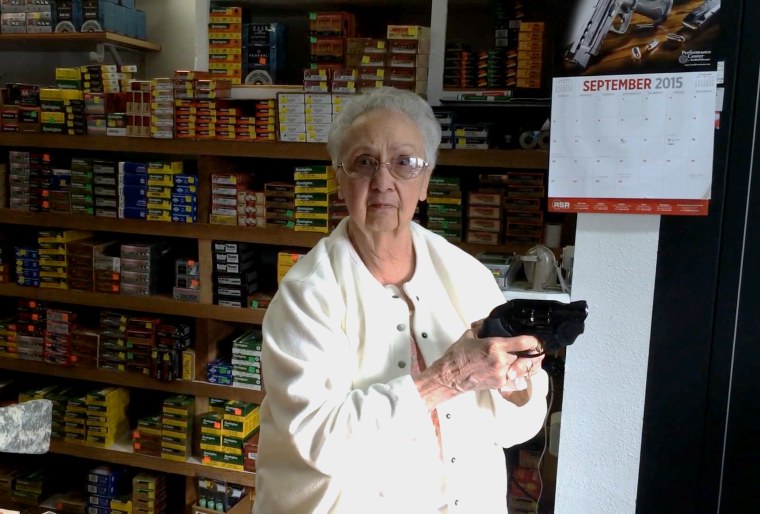ROSEBURG, Oregon — While the killing power of firearms is inevitably the focus in the wake of tragedies such as the mass shooting at Oregon’s Umpqua Community College, 86-year-old Carolyn Kellim is living proof that, in the right hands, guns also can contribute to acts of kindness.
Kellim is a white-haired great-grandmother who runs KC’s Exchange gun shop out of her home in a quiet residential neighborhood in Roseburg, Oregon.
But she donates all the profits from her business to Casa de Belen, a local charity that provides transitional housing for homeless families with adolescents and homeless teens.
“I’m doing the best I can to make as much money as I can to give to a charity that works with kids and families,” Kellim told NBC News Friday, standing behind the counter in her one-room shop, which is crammed with rifles, handguns, ammunition and hunting accessories.
“That’s so important in today’s world. We have to take care of people that have had a bad luck stroke.”
If there is such a thing as a stereotypical gun shop owner, Kellim doesn’t come close to fitting it. She stands just a few inches over 5 feet tall, with short but carefully coiffed hair and wire-rim glasses. She would look perfectly at home serving a Thanksgiving turkey with all the trimmings.

But in this hunting-mad area of central Oregon, where guns are as typical as cellphones in the big city and the sight of people in full camouflage outfits doesn’t raise an eyebrow — she doesn’t see anything unusual about her chosen profession.
“I just run a little gun shop,” she said, cradling her weapon of choice, a Ruger LCR .22 Magnum revolver.
Kellim can talk the talk of the gun rights movement when discussing the tragedy that occurred less than 10 miles away from the quiet, tree-lined street where she tends her shop, which has a small sign out front and a separate entrance, but is otherwise inseparable from home that she shares with her husband of 49 years.
Asked if additional checks or restrictions on gun ownership could help avert tragedies like the one at UCC, she bristled at the suggestion, albeit good naturedly.
“I think that’s the worst thing in the world they could do,” she said. “They’ve got so many laws now that they are not even looking at, and more constraints on guns is not the answer.”
And she expresses particular disdain for President Barack Obama, whom she refers to as the “executive anus.”
“He has strange ideas,” she said. “I don’t think he’s ever carried a gun. I’m not sure he’s ever shot one … but he seems to think that they’re bad all the way through. They’re not.”
But she was one of the only residents we met during a three-day stay in Roseburg last week to express empathy for Christopher Harper Mercer, the 26-year-old gunman who killed nine students at the college before committing suicide.
“How can you hate him? You don’t know him,” she said. "He was just a child ... He probably had his ups and downs, mostly downs. How are you going to come out of that if someone doesn’t care.”
Asked if she had any thoughts on how mass shooting like the one at UCC could be prevented, Kellim said the issue defies simple solutions. But she said that every American needs to make an effort to try and help alienated and mentally troubled individuals before they erupt.
“The thing that we need to do ... we need to love people a heck of a lot more and make sure that all of our people in this community are accepted and that they have friends and that they have somebody maybe to just sit down and talk to,” she said.
"I think you’ll find that you’ll get a lot better response from just loving people than you will from trying to find fault with them and trying to keep them controlled. Control is for animals. It’s not for humans."
